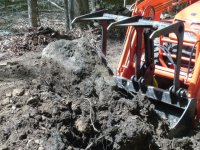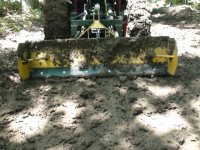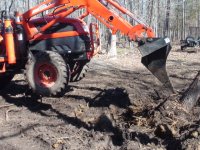lol64
New member
First of all a big thank you to the forum for all the info on here! I'm in the UK with a long compacted stone track to maintain and box blades are relatively unheard of over here. Most people you ask flat out advise you that they wouldn't be strong / heavy enough to loosen heavily compacted stone and the only way to do the job properly is with heavy machinery. Well, I am glad that I ignored that advice and followed the advice on TBN. I found a company that makes box blades in England (Oxdale) and bought a 72 inch one, delivered yesterday. A few hours of work today and I was pretty impressed at the results on a long heavily pot holed stretch, no pot holes now and nice and smooth & level! I'm glad I learned the basics on this forum, I followed the advice and it came out good!
My small contribution to all the knowledge here... brush the water out of those pot holes before starting. We had rain yesterday, dry today, so conditions were pretty ideal. With hindsight of course it's obvious that you need to remove the standing water, but I just left it and so now those "wet patches" that used to be the deeper pot holes are now soft after I compacted the track. You live and learn and I won't make that mistake again.
My small contribution to all the knowledge here... brush the water out of those pot holes before starting. We had rain yesterday, dry today, so conditions were pretty ideal. With hindsight of course it's obvious that you need to remove the standing water, but I just left it and so now those "wet patches" that used to be the deeper pot holes are now soft after I compacted the track. You live and learn and I won't make that mistake again.



